Detailed Report: Entrepreneurship and Small Business Management in UK
VerifiedAdded on 2020/11/23
|16
|4633
|162
Report
AI Summary
This report provides a comprehensive analysis of entrepreneurship and small business management, focusing on the UK context. It begins by defining entrepreneurship and exploring different entrepreneurial ventures, including micro, small, medium, and large enterprises, as well as their typologies like established, second-stage/gazelles, and social good entrepreneurship. The report then compares and contrasts these ventures, highlighting their similarities and differences in terms of size, scope, goals, profits, and risks. A significant portion of the report is dedicated to examining the impact of micro and small businesses on the UK economy, emphasizing their contribution to revenue, job creation, and overall economic stability, both before and after Brexit. The report also explores the contributions of small businesses to social economic growth in the post-Brexit era. Finally, it discusses the characteristics, traits, and skills of successful entrepreneurs and how these differ from those of traditional managers. The report also considers how background and experiences can either hinder or foster entrepreneurship.
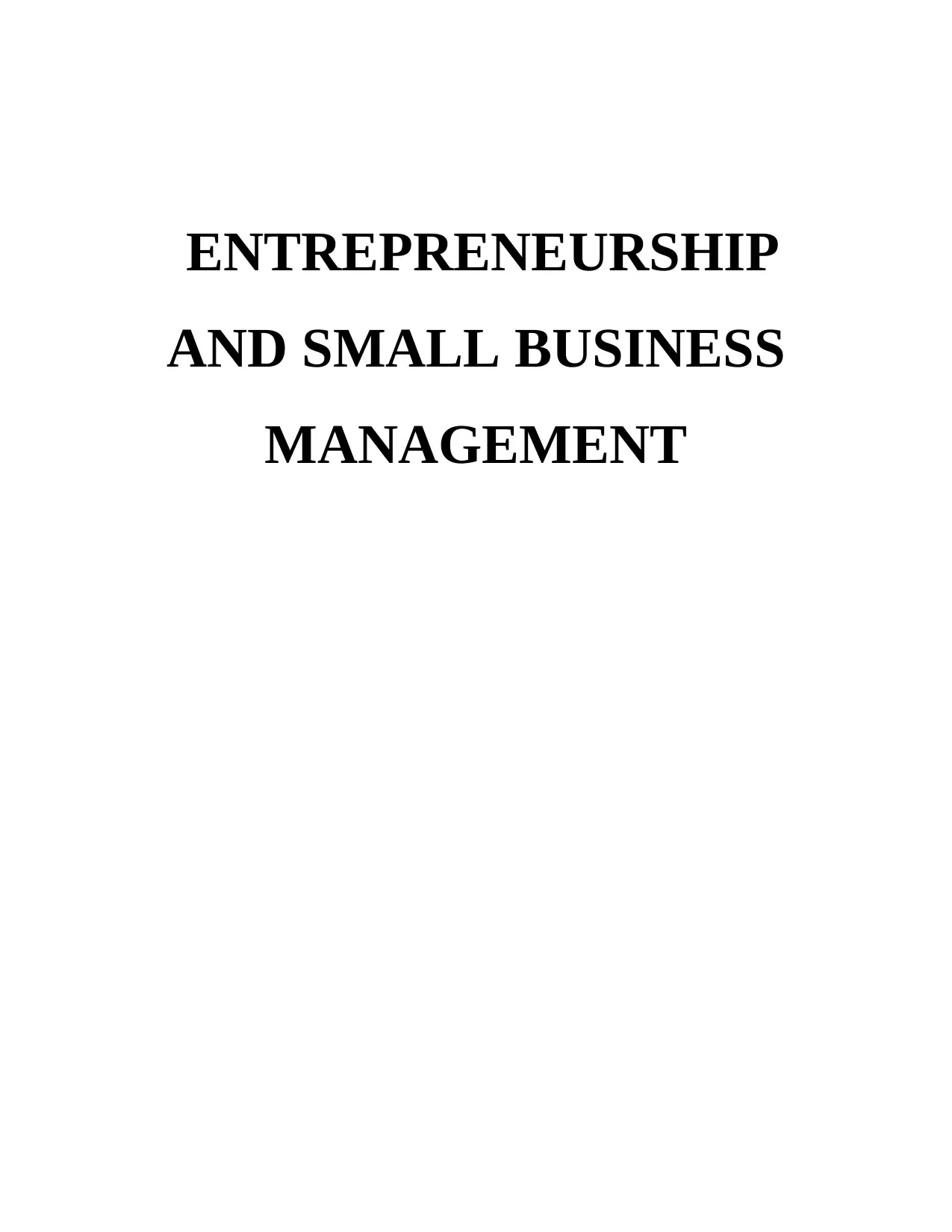
ENTREPRENEURSHIP
AND SMALL BUSINESS
MANAGEMENT
AND SMALL BUSINESS
MANAGEMENT
Paraphrase This Document
Need a fresh take? Get an instant paraphrase of this document with our AI Paraphraser
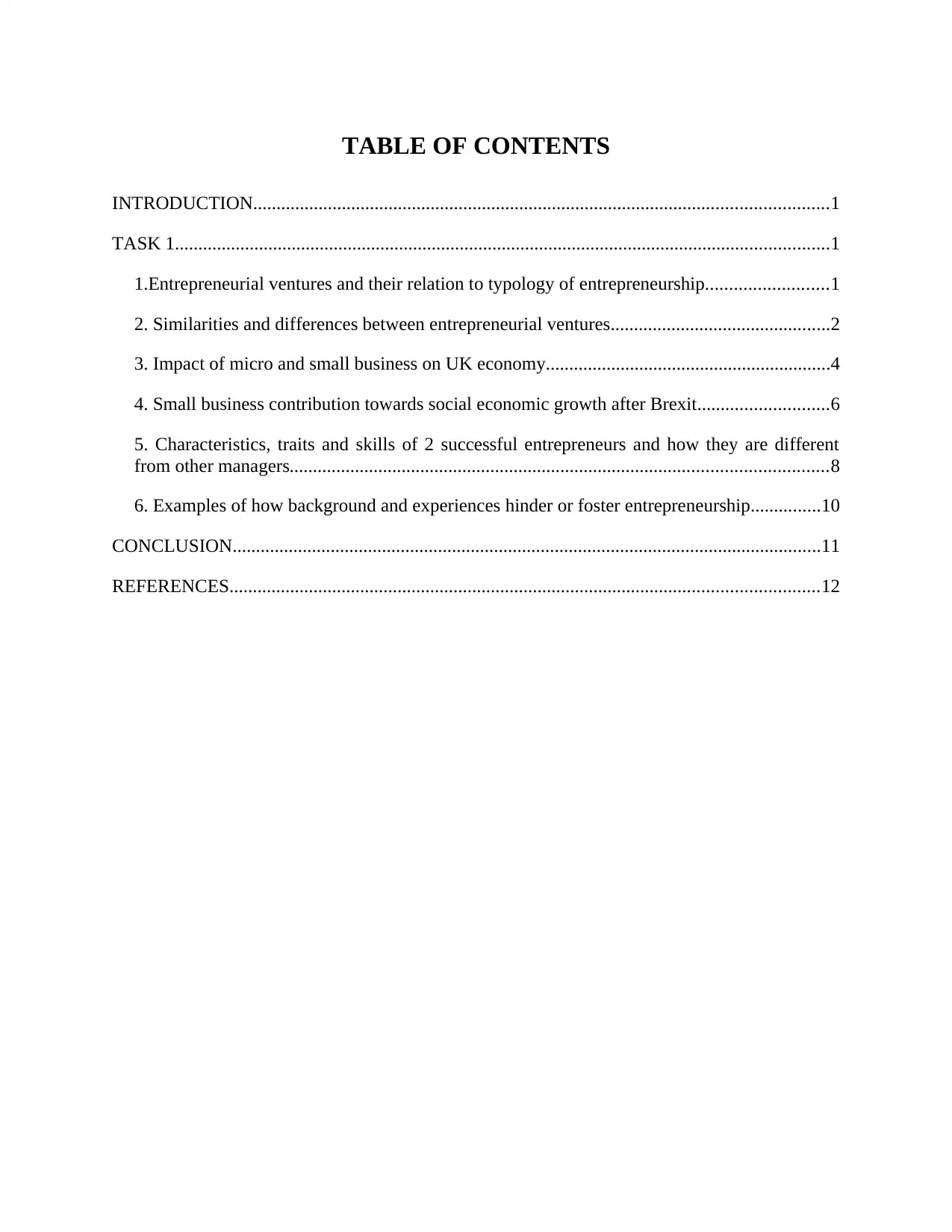
TABLE OF CONTENTS
INTRODUCTION...........................................................................................................................1
TASK 1............................................................................................................................................1
1.Entrepreneurial ventures and their relation to typology of entrepreneurship..........................1
2. Similarities and differences between entrepreneurial ventures...............................................2
3. Impact of micro and small business on UK economy.............................................................4
4. Small business contribution towards social economic growth after Brexit............................6
5. Characteristics, traits and skills of 2 successful entrepreneurs and how they are different
from other managers...................................................................................................................8
6. Examples of how background and experiences hinder or foster entrepreneurship...............10
CONCLUSION..............................................................................................................................11
REFERENCES..............................................................................................................................12
INTRODUCTION...........................................................................................................................1
TASK 1............................................................................................................................................1
1.Entrepreneurial ventures and their relation to typology of entrepreneurship..........................1
2. Similarities and differences between entrepreneurial ventures...............................................2
3. Impact of micro and small business on UK economy.............................................................4
4. Small business contribution towards social economic growth after Brexit............................6
5. Characteristics, traits and skills of 2 successful entrepreneurs and how they are different
from other managers...................................................................................................................8
6. Examples of how background and experiences hinder or foster entrepreneurship...............10
CONCLUSION..............................................................................................................................11
REFERENCES..............................................................................................................................12
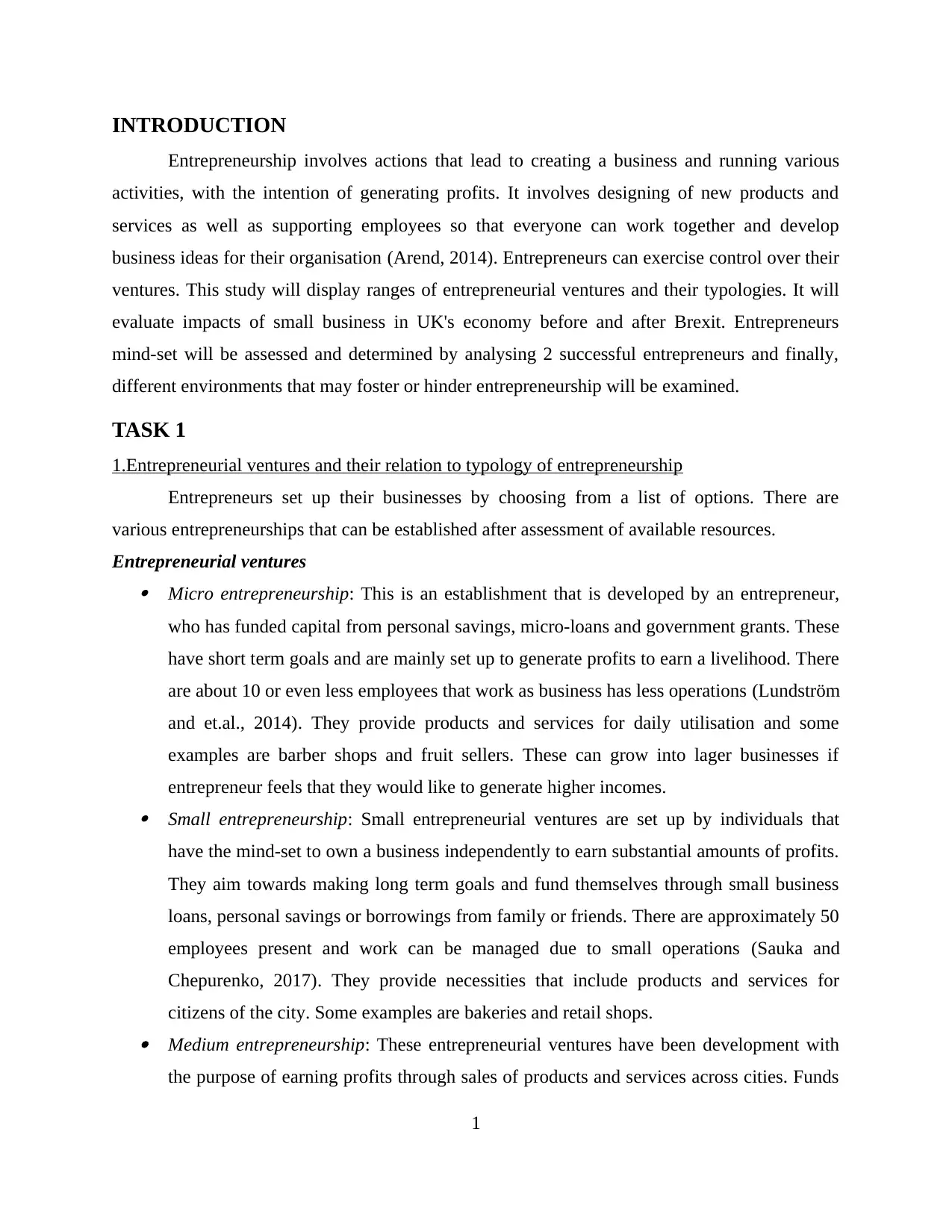
INTRODUCTION
Entrepreneurship involves actions that lead to creating a business and running various
activities, with the intention of generating profits. It involves designing of new products and
services as well as supporting employees so that everyone can work together and develop
business ideas for their organisation (Arend, 2014). Entrepreneurs can exercise control over their
ventures. This study will display ranges of entrepreneurial ventures and their typologies. It will
evaluate impacts of small business in UK's economy before and after Brexit. Entrepreneurs
mind-set will be assessed and determined by analysing 2 successful entrepreneurs and finally,
different environments that may foster or hinder entrepreneurship will be examined.
TASK 1
1.Entrepreneurial ventures and their relation to typology of entrepreneurship
Entrepreneurs set up their businesses by choosing from a list of options. There are
various entrepreneurships that can be established after assessment of available resources.
Entrepreneurial ventures Micro entrepreneurship: This is an establishment that is developed by an entrepreneur,
who has funded capital from personal savings, micro-loans and government grants. These
have short term goals and are mainly set up to generate profits to earn a livelihood. There
are about 10 or even less employees that work as business has less operations (Lundström
and et.al., 2014). They provide products and services for daily utilisation and some
examples are barber shops and fruit sellers. These can grow into lager businesses if
entrepreneur feels that they would like to generate higher incomes. Small entrepreneurship: Small entrepreneurial ventures are set up by individuals that
have the mind-set to own a business independently to earn substantial amounts of profits.
They aim towards making long term goals and fund themselves through small business
loans, personal savings or borrowings from family or friends. There are approximately 50
employees present and work can be managed due to small operations (Sauka and
Chepurenko, 2017). They provide necessities that include products and services for
citizens of the city. Some examples are bakeries and retail shops. Medium entrepreneurship: These entrepreneurial ventures have been development with
the purpose of earning profits through sales of products and services across cities. Funds
1
Entrepreneurship involves actions that lead to creating a business and running various
activities, with the intention of generating profits. It involves designing of new products and
services as well as supporting employees so that everyone can work together and develop
business ideas for their organisation (Arend, 2014). Entrepreneurs can exercise control over their
ventures. This study will display ranges of entrepreneurial ventures and their typologies. It will
evaluate impacts of small business in UK's economy before and after Brexit. Entrepreneurs
mind-set will be assessed and determined by analysing 2 successful entrepreneurs and finally,
different environments that may foster or hinder entrepreneurship will be examined.
TASK 1
1.Entrepreneurial ventures and their relation to typology of entrepreneurship
Entrepreneurs set up their businesses by choosing from a list of options. There are
various entrepreneurships that can be established after assessment of available resources.
Entrepreneurial ventures Micro entrepreneurship: This is an establishment that is developed by an entrepreneur,
who has funded capital from personal savings, micro-loans and government grants. These
have short term goals and are mainly set up to generate profits to earn a livelihood. There
are about 10 or even less employees that work as business has less operations (Lundström
and et.al., 2014). They provide products and services for daily utilisation and some
examples are barber shops and fruit sellers. These can grow into lager businesses if
entrepreneur feels that they would like to generate higher incomes. Small entrepreneurship: Small entrepreneurial ventures are set up by individuals that
have the mind-set to own a business independently to earn substantial amounts of profits.
They aim towards making long term goals and fund themselves through small business
loans, personal savings or borrowings from family or friends. There are approximately 50
employees present and work can be managed due to small operations (Sauka and
Chepurenko, 2017). They provide necessities that include products and services for
citizens of the city. Some examples are bakeries and retail shops. Medium entrepreneurship: These entrepreneurial ventures have been development with
the purpose of earning profits through sales of products and services across cities. Funds
1
⊘ This is a preview!⊘
Do you want full access?
Subscribe today to unlock all pages.

Trusted by 1+ million students worldwide
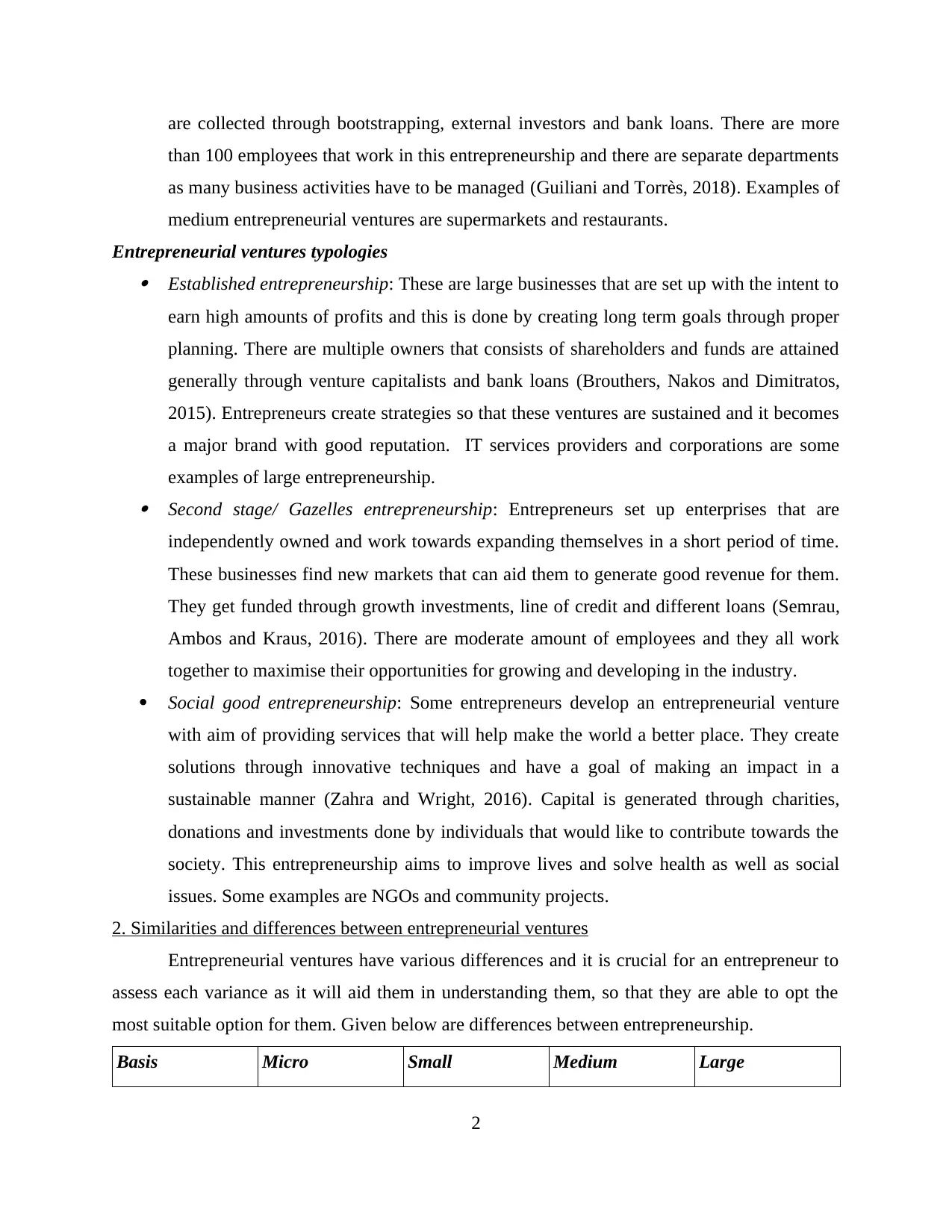
are collected through bootstrapping, external investors and bank loans. There are more
than 100 employees that work in this entrepreneurship and there are separate departments
as many business activities have to be managed (Guiliani and Torrès, 2018). Examples of
medium entrepreneurial ventures are supermarkets and restaurants.
Entrepreneurial ventures typologies Established entrepreneurship: These are large businesses that are set up with the intent to
earn high amounts of profits and this is done by creating long term goals through proper
planning. There are multiple owners that consists of shareholders and funds are attained
generally through venture capitalists and bank loans (Brouthers, Nakos and Dimitratos,
2015). Entrepreneurs create strategies so that these ventures are sustained and it becomes
a major brand with good reputation. IT services providers and corporations are some
examples of large entrepreneurship. Second stage/ Gazelles entrepreneurship: Entrepreneurs set up enterprises that are
independently owned and work towards expanding themselves in a short period of time.
These businesses find new markets that can aid them to generate good revenue for them.
They get funded through growth investments, line of credit and different loans (Semrau,
Ambos and Kraus, 2016). There are moderate amount of employees and they all work
together to maximise their opportunities for growing and developing in the industry.
Social good entrepreneurship: Some entrepreneurs develop an entrepreneurial venture
with aim of providing services that will help make the world a better place. They create
solutions through innovative techniques and have a goal of making an impact in a
sustainable manner (Zahra and Wright, 2016). Capital is generated through charities,
donations and investments done by individuals that would like to contribute towards the
society. This entrepreneurship aims to improve lives and solve health as well as social
issues. Some examples are NGOs and community projects.
2. Similarities and differences between entrepreneurial ventures
Entrepreneurial ventures have various differences and it is crucial for an entrepreneur to
assess each variance as it will aid them in understanding them, so that they are able to opt the
most suitable option for them. Given below are differences between entrepreneurship.
Basis Micro Small Medium Large
2
than 100 employees that work in this entrepreneurship and there are separate departments
as many business activities have to be managed (Guiliani and Torrès, 2018). Examples of
medium entrepreneurial ventures are supermarkets and restaurants.
Entrepreneurial ventures typologies Established entrepreneurship: These are large businesses that are set up with the intent to
earn high amounts of profits and this is done by creating long term goals through proper
planning. There are multiple owners that consists of shareholders and funds are attained
generally through venture capitalists and bank loans (Brouthers, Nakos and Dimitratos,
2015). Entrepreneurs create strategies so that these ventures are sustained and it becomes
a major brand with good reputation. IT services providers and corporations are some
examples of large entrepreneurship. Second stage/ Gazelles entrepreneurship: Entrepreneurs set up enterprises that are
independently owned and work towards expanding themselves in a short period of time.
These businesses find new markets that can aid them to generate good revenue for them.
They get funded through growth investments, line of credit and different loans (Semrau,
Ambos and Kraus, 2016). There are moderate amount of employees and they all work
together to maximise their opportunities for growing and developing in the industry.
Social good entrepreneurship: Some entrepreneurs develop an entrepreneurial venture
with aim of providing services that will help make the world a better place. They create
solutions through innovative techniques and have a goal of making an impact in a
sustainable manner (Zahra and Wright, 2016). Capital is generated through charities,
donations and investments done by individuals that would like to contribute towards the
society. This entrepreneurship aims to improve lives and solve health as well as social
issues. Some examples are NGOs and community projects.
2. Similarities and differences between entrepreneurial ventures
Entrepreneurial ventures have various differences and it is crucial for an entrepreneur to
assess each variance as it will aid them in understanding them, so that they are able to opt the
most suitable option for them. Given below are differences between entrepreneurship.
Basis Micro Small Medium Large
2
Paraphrase This Document
Need a fresh take? Get an instant paraphrase of this document with our AI Paraphraser
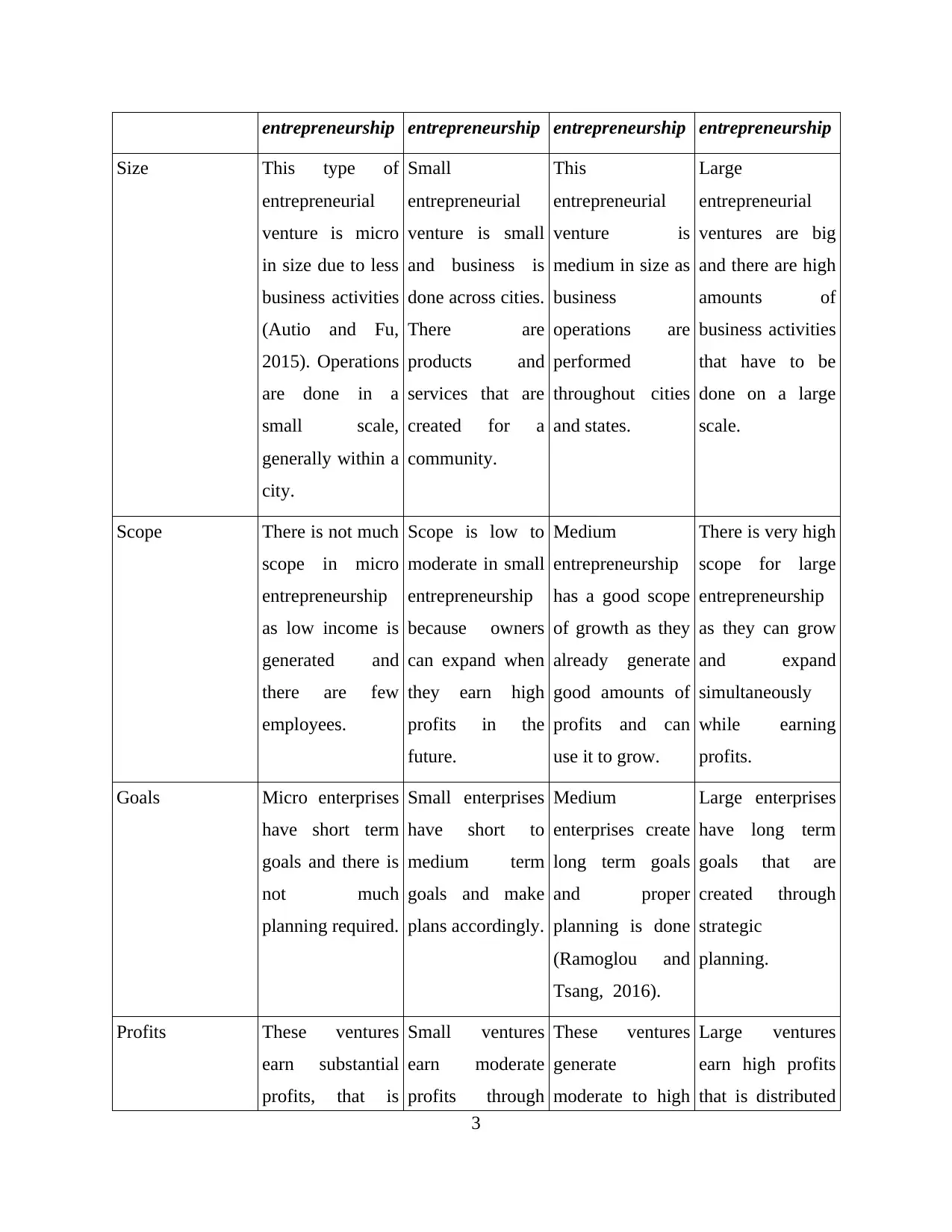
entrepreneurship entrepreneurship entrepreneurship entrepreneurship
Size This type of
entrepreneurial
venture is micro
in size due to less
business activities
(Autio and Fu,
2015). Operations
are done in a
small scale,
generally within a
city.
Small
entrepreneurial
venture is small
and business is
done across cities.
There are
products and
services that are
created for a
community.
This
entrepreneurial
venture is
medium in size as
business
operations are
performed
throughout cities
and states.
Large
entrepreneurial
ventures are big
and there are high
amounts of
business activities
that have to be
done on a large
scale.
Scope There is not much
scope in micro
entrepreneurship
as low income is
generated and
there are few
employees.
Scope is low to
moderate in small
entrepreneurship
because owners
can expand when
they earn high
profits in the
future.
Medium
entrepreneurship
has a good scope
of growth as they
already generate
good amounts of
profits and can
use it to grow.
There is very high
scope for large
entrepreneurship
as they can grow
and expand
simultaneously
while earning
profits.
Goals Micro enterprises
have short term
goals and there is
not much
planning required.
Small enterprises
have short to
medium term
goals and make
plans accordingly.
Medium
enterprises create
long term goals
and proper
planning is done
(Ramoglou and
Tsang, 2016).
Large enterprises
have long term
goals that are
created through
strategic
planning.
Profits These ventures
earn substantial
profits, that is
Small ventures
earn moderate
profits through
These ventures
generate
moderate to high
Large ventures
earn high profits
that is distributed
3
Size This type of
entrepreneurial
venture is micro
in size due to less
business activities
(Autio and Fu,
2015). Operations
are done in a
small scale,
generally within a
city.
Small
entrepreneurial
venture is small
and business is
done across cities.
There are
products and
services that are
created for a
community.
This
entrepreneurial
venture is
medium in size as
business
operations are
performed
throughout cities
and states.
Large
entrepreneurial
ventures are big
and there are high
amounts of
business activities
that have to be
done on a large
scale.
Scope There is not much
scope in micro
entrepreneurship
as low income is
generated and
there are few
employees.
Scope is low to
moderate in small
entrepreneurship
because owners
can expand when
they earn high
profits in the
future.
Medium
entrepreneurship
has a good scope
of growth as they
already generate
good amounts of
profits and can
use it to grow.
There is very high
scope for large
entrepreneurship
as they can grow
and expand
simultaneously
while earning
profits.
Goals Micro enterprises
have short term
goals and there is
not much
planning required.
Small enterprises
have short to
medium term
goals and make
plans accordingly.
Medium
enterprises create
long term goals
and proper
planning is done
(Ramoglou and
Tsang, 2016).
Large enterprises
have long term
goals that are
created through
strategic
planning.
Profits These ventures
earn substantial
profits, that is
Small ventures
earn moderate
profits through
These ventures
generate
moderate to high
Large ventures
earn high profits
that is distributed
3
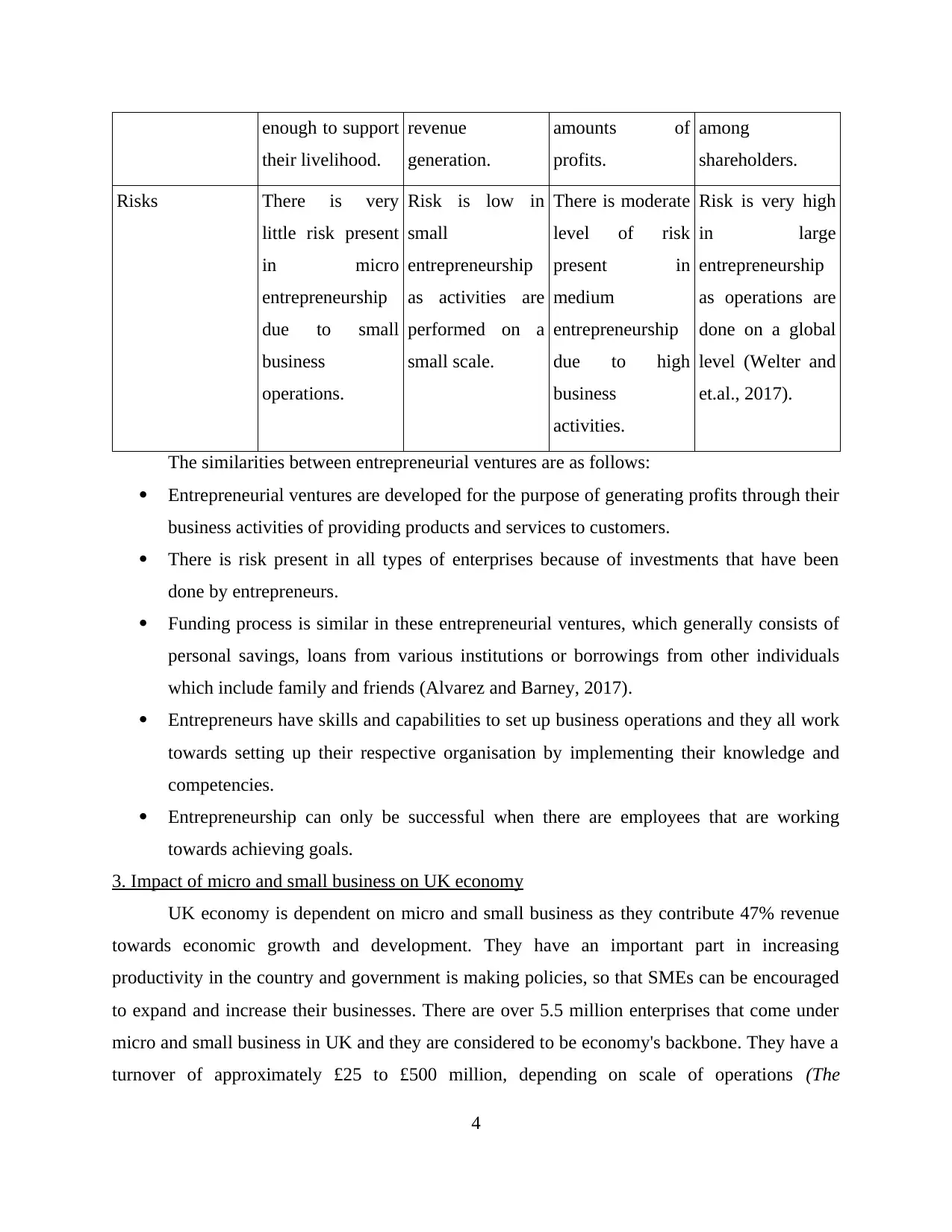
enough to support
their livelihood.
revenue
generation.
amounts of
profits.
among
shareholders.
Risks There is very
little risk present
in micro
entrepreneurship
due to small
business
operations.
Risk is low in
small
entrepreneurship
as activities are
performed on a
small scale.
There is moderate
level of risk
present in
medium
entrepreneurship
due to high
business
activities.
Risk is very high
in large
entrepreneurship
as operations are
done on a global
level (Welter and
et.al., 2017).
The similarities between entrepreneurial ventures are as follows:
Entrepreneurial ventures are developed for the purpose of generating profits through their
business activities of providing products and services to customers.
There is risk present in all types of enterprises because of investments that have been
done by entrepreneurs.
Funding process is similar in these entrepreneurial ventures, which generally consists of
personal savings, loans from various institutions or borrowings from other individuals
which include family and friends (Alvarez and Barney, 2017).
Entrepreneurs have skills and capabilities to set up business operations and they all work
towards setting up their respective organisation by implementing their knowledge and
competencies.
Entrepreneurship can only be successful when there are employees that are working
towards achieving goals.
3. Impact of micro and small business on UK economy
UK economy is dependent on micro and small business as they contribute 47% revenue
towards economic growth and development. They have an important part in increasing
productivity in the country and government is making policies, so that SMEs can be encouraged
to expand and increase their businesses. There are over 5.5 million enterprises that come under
micro and small business in UK and they are considered to be economy's backbone. They have a
turnover of approximately £25 to £500 million, depending on scale of operations (The
4
their livelihood.
revenue
generation.
amounts of
profits.
among
shareholders.
Risks There is very
little risk present
in micro
entrepreneurship
due to small
business
operations.
Risk is low in
small
entrepreneurship
as activities are
performed on a
small scale.
There is moderate
level of risk
present in
medium
entrepreneurship
due to high
business
activities.
Risk is very high
in large
entrepreneurship
as operations are
done on a global
level (Welter and
et.al., 2017).
The similarities between entrepreneurial ventures are as follows:
Entrepreneurial ventures are developed for the purpose of generating profits through their
business activities of providing products and services to customers.
There is risk present in all types of enterprises because of investments that have been
done by entrepreneurs.
Funding process is similar in these entrepreneurial ventures, which generally consists of
personal savings, loans from various institutions or borrowings from other individuals
which include family and friends (Alvarez and Barney, 2017).
Entrepreneurs have skills and capabilities to set up business operations and they all work
towards setting up their respective organisation by implementing their knowledge and
competencies.
Entrepreneurship can only be successful when there are employees that are working
towards achieving goals.
3. Impact of micro and small business on UK economy
UK economy is dependent on micro and small business as they contribute 47% revenue
towards economic growth and development. They have an important part in increasing
productivity in the country and government is making policies, so that SMEs can be encouraged
to expand and increase their businesses. There are over 5.5 million enterprises that come under
micro and small business in UK and they are considered to be economy's backbone. They have a
turnover of approximately £25 to £500 million, depending on scale of operations (The
4
⊘ This is a preview!⊘
Do you want full access?
Subscribe today to unlock all pages.

Trusted by 1+ million students worldwide
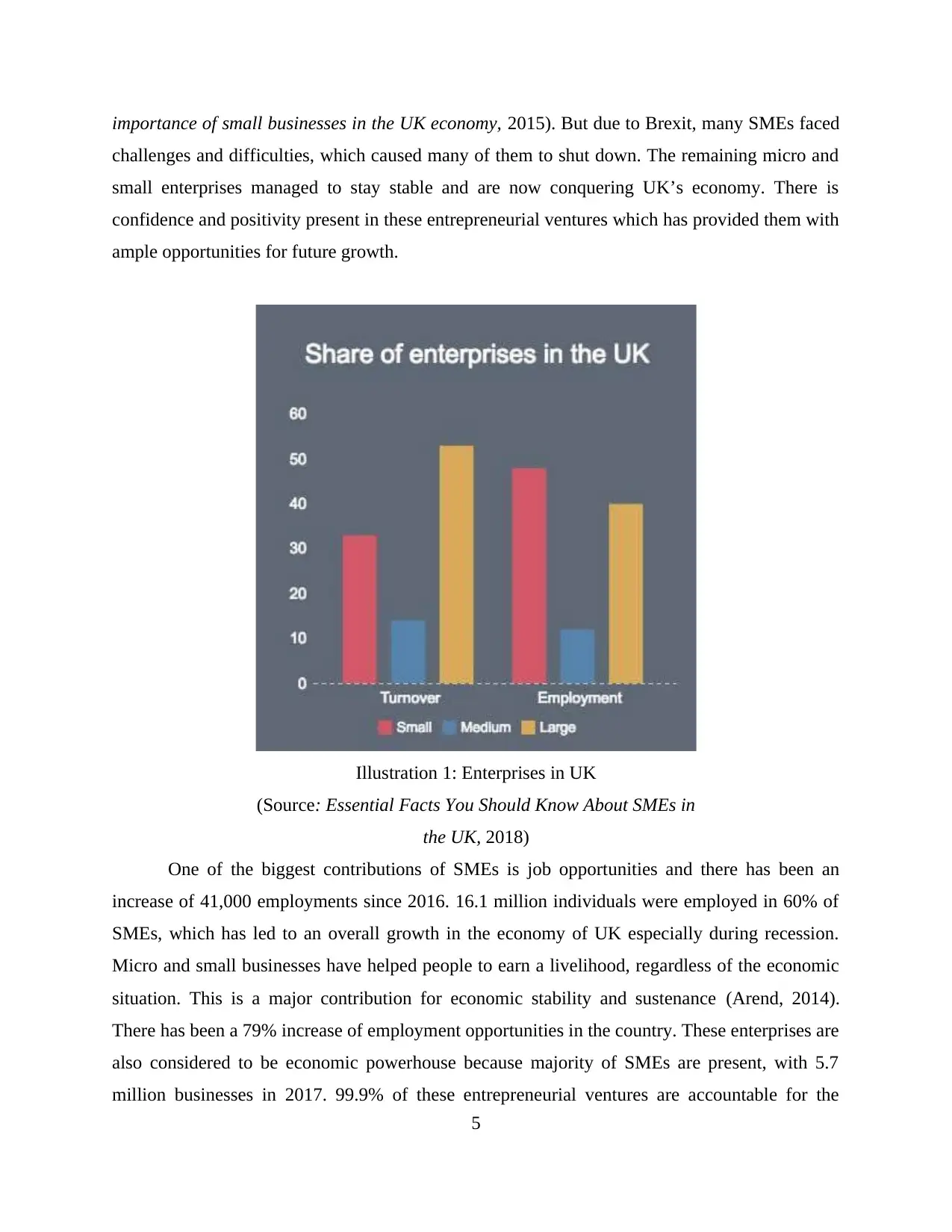
importance of small businesses in the UK economy, 2015). But due to Brexit, many SMEs faced
challenges and difficulties, which caused many of them to shut down. The remaining micro and
small enterprises managed to stay stable and are now conquering UK’s economy. There is
confidence and positivity present in these entrepreneurial ventures which has provided them with
ample opportunities for future growth.
Illustration 1: Enterprises in UK
(Source: Essential Facts You Should Know About SMEs in
the UK, 2018)
One of the biggest contributions of SMEs is job opportunities and there has been an
increase of 41,000 employments since 2016. 16.1 million individuals were employed in 60% of
SMEs, which has led to an overall growth in the economy of UK especially during recession.
Micro and small businesses have helped people to earn a livelihood, regardless of the economic
situation. This is a major contribution for economic stability and sustenance (Arend, 2014).
There has been a 79% increase of employment opportunities in the country. These enterprises are
also considered to be economic powerhouse because majority of SMEs are present, with 5.7
million businesses in 2017. 99.9% of these entrepreneurial ventures are accountable for the
5
challenges and difficulties, which caused many of them to shut down. The remaining micro and
small enterprises managed to stay stable and are now conquering UK’s economy. There is
confidence and positivity present in these entrepreneurial ventures which has provided them with
ample opportunities for future growth.
Illustration 1: Enterprises in UK
(Source: Essential Facts You Should Know About SMEs in
the UK, 2018)
One of the biggest contributions of SMEs is job opportunities and there has been an
increase of 41,000 employments since 2016. 16.1 million individuals were employed in 60% of
SMEs, which has led to an overall growth in the economy of UK especially during recession.
Micro and small businesses have helped people to earn a livelihood, regardless of the economic
situation. This is a major contribution for economic stability and sustenance (Arend, 2014).
There has been a 79% increase of employment opportunities in the country. These enterprises are
also considered to be economic powerhouse because majority of SMEs are present, with 5.7
million businesses in 2017. 99.9% of these entrepreneurial ventures are accountable for the
5
Paraphrase This Document
Need a fresh take? Get an instant paraphrase of this document with our AI Paraphraser
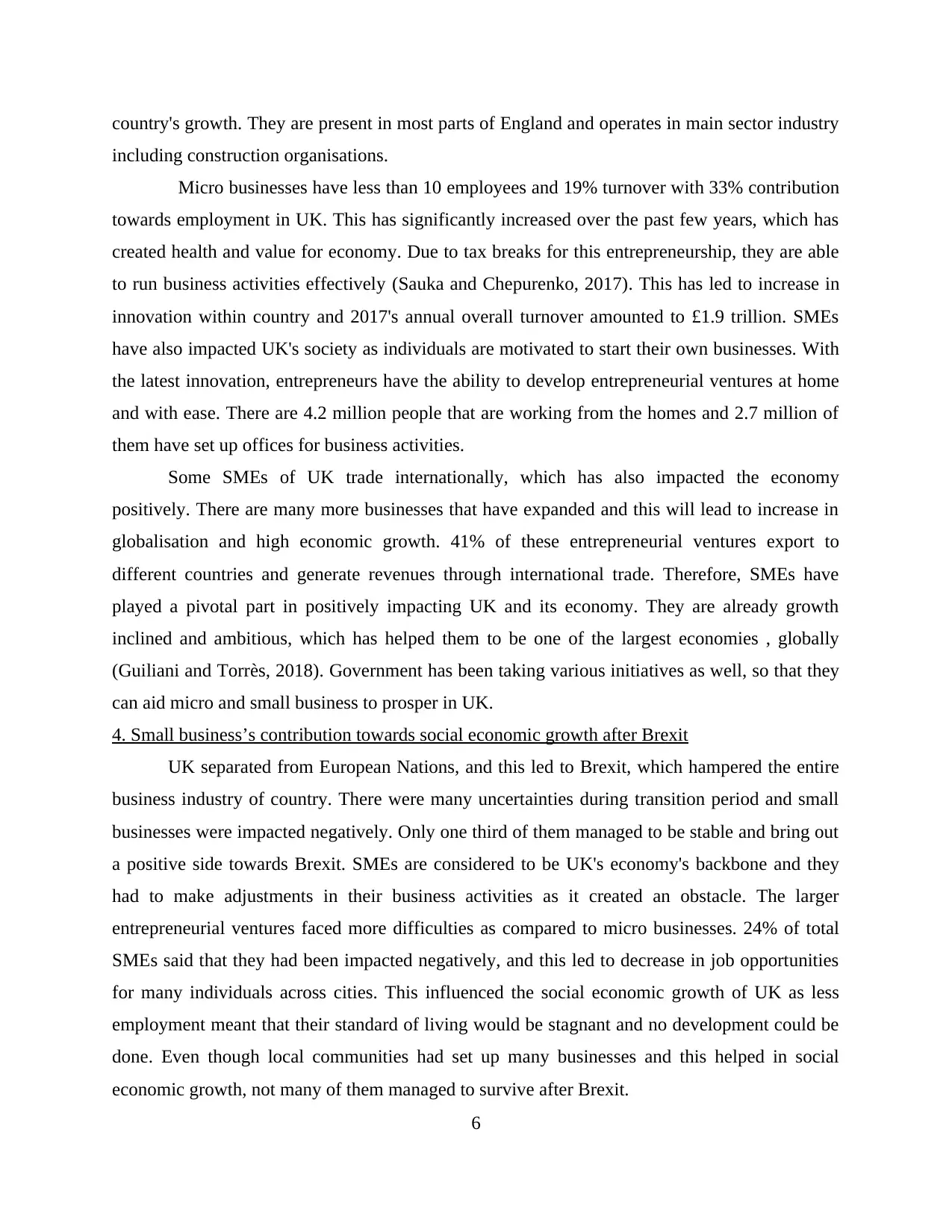
country's growth. They are present in most parts of England and operates in main sector industry
including construction organisations.
Micro businesses have less than 10 employees and 19% turnover with 33% contribution
towards employment in UK. This has significantly increased over the past few years, which has
created health and value for economy. Due to tax breaks for this entrepreneurship, they are able
to run business activities effectively (Sauka and Chepurenko, 2017). This has led to increase in
innovation within country and 2017's annual overall turnover amounted to £1.9 trillion. SMEs
have also impacted UK's society as individuals are motivated to start their own businesses. With
the latest innovation, entrepreneurs have the ability to develop entrepreneurial ventures at home
and with ease. There are 4.2 million people that are working from the homes and 2.7 million of
them have set up offices for business activities.
Some SMEs of UK trade internationally, which has also impacted the economy
positively. There are many more businesses that have expanded and this will lead to increase in
globalisation and high economic growth. 41% of these entrepreneurial ventures export to
different countries and generate revenues through international trade. Therefore, SMEs have
played a pivotal part in positively impacting UK and its economy. They are already growth
inclined and ambitious, which has helped them to be one of the largest economies , globally
(Guiliani and Torrès, 2018). Government has been taking various initiatives as well, so that they
can aid micro and small business to prosper in UK.
4. Small business’s contribution towards social economic growth after Brexit
UK separated from European Nations, and this led to Brexit, which hampered the entire
business industry of country. There were many uncertainties during transition period and small
businesses were impacted negatively. Only one third of them managed to be stable and bring out
a positive side towards Brexit. SMEs are considered to be UK's economy's backbone and they
had to make adjustments in their business activities as it created an obstacle. The larger
entrepreneurial ventures faced more difficulties as compared to micro businesses. 24% of total
SMEs said that they had been impacted negatively, and this led to decrease in job opportunities
for many individuals across cities. This influenced the social economic growth of UK as less
employment meant that their standard of living would be stagnant and no development could be
done. Even though local communities had set up many businesses and this helped in social
economic growth, not many of them managed to survive after Brexit.
6
including construction organisations.
Micro businesses have less than 10 employees and 19% turnover with 33% contribution
towards employment in UK. This has significantly increased over the past few years, which has
created health and value for economy. Due to tax breaks for this entrepreneurship, they are able
to run business activities effectively (Sauka and Chepurenko, 2017). This has led to increase in
innovation within country and 2017's annual overall turnover amounted to £1.9 trillion. SMEs
have also impacted UK's society as individuals are motivated to start their own businesses. With
the latest innovation, entrepreneurs have the ability to develop entrepreneurial ventures at home
and with ease. There are 4.2 million people that are working from the homes and 2.7 million of
them have set up offices for business activities.
Some SMEs of UK trade internationally, which has also impacted the economy
positively. There are many more businesses that have expanded and this will lead to increase in
globalisation and high economic growth. 41% of these entrepreneurial ventures export to
different countries and generate revenues through international trade. Therefore, SMEs have
played a pivotal part in positively impacting UK and its economy. They are already growth
inclined and ambitious, which has helped them to be one of the largest economies , globally
(Guiliani and Torrès, 2018). Government has been taking various initiatives as well, so that they
can aid micro and small business to prosper in UK.
4. Small business’s contribution towards social economic growth after Brexit
UK separated from European Nations, and this led to Brexit, which hampered the entire
business industry of country. There were many uncertainties during transition period and small
businesses were impacted negatively. Only one third of them managed to be stable and bring out
a positive side towards Brexit. SMEs are considered to be UK's economy's backbone and they
had to make adjustments in their business activities as it created an obstacle. The larger
entrepreneurial ventures faced more difficulties as compared to micro businesses. 24% of total
SMEs said that they had been impacted negatively, and this led to decrease in job opportunities
for many individuals across cities. This influenced the social economic growth of UK as less
employment meant that their standard of living would be stagnant and no development could be
done. Even though local communities had set up many businesses and this helped in social
economic growth, not many of them managed to survive after Brexit.
6
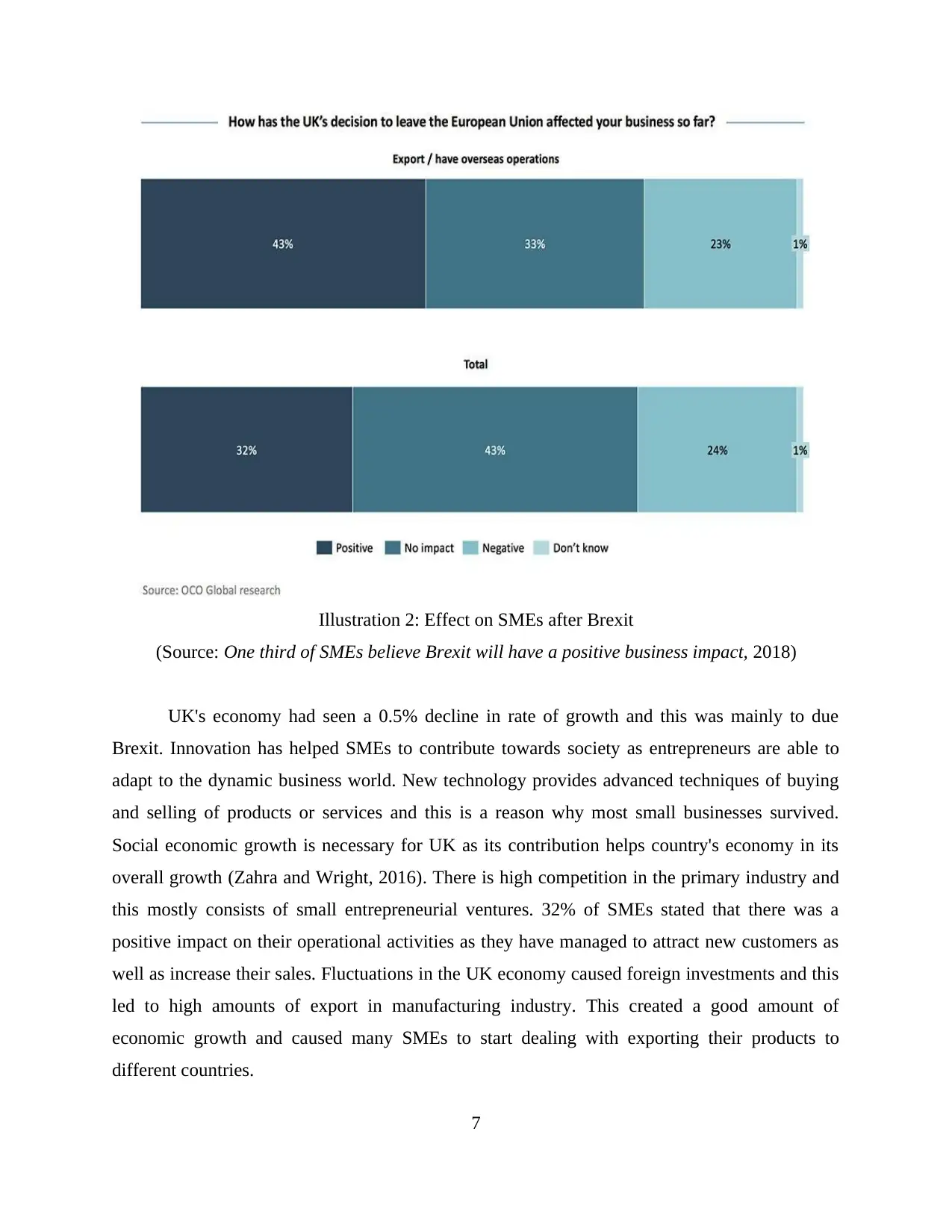
Illustration 2: Effect on SMEs after Brexit
(Source: One third of SMEs believe Brexit will have a positive business impact, 2018)
UK's economy had seen a 0.5% decline in rate of growth and this was mainly to due
Brexit. Innovation has helped SMEs to contribute towards society as entrepreneurs are able to
adapt to the dynamic business world. New technology provides advanced techniques of buying
and selling of products or services and this is a reason why most small businesses survived.
Social economic growth is necessary for UK as its contribution helps country's economy in its
overall growth (Zahra and Wright, 2016). There is high competition in the primary industry and
this mostly consists of small entrepreneurial ventures. 32% of SMEs stated that there was a
positive impact on their operational activities as they have managed to attract new customers as
well as increase their sales. Fluctuations in the UK economy caused foreign investments and this
led to high amounts of export in manufacturing industry. This created a good amount of
economic growth and caused many SMEs to start dealing with exporting their products to
different countries.
7
(Source: One third of SMEs believe Brexit will have a positive business impact, 2018)
UK's economy had seen a 0.5% decline in rate of growth and this was mainly to due
Brexit. Innovation has helped SMEs to contribute towards society as entrepreneurs are able to
adapt to the dynamic business world. New technology provides advanced techniques of buying
and selling of products or services and this is a reason why most small businesses survived.
Social economic growth is necessary for UK as its contribution helps country's economy in its
overall growth (Zahra and Wright, 2016). There is high competition in the primary industry and
this mostly consists of small entrepreneurial ventures. 32% of SMEs stated that there was a
positive impact on their operational activities as they have managed to attract new customers as
well as increase their sales. Fluctuations in the UK economy caused foreign investments and this
led to high amounts of export in manufacturing industry. This created a good amount of
economic growth and caused many SMEs to start dealing with exporting their products to
different countries.
7
⊘ This is a preview!⊘
Do you want full access?
Subscribe today to unlock all pages.

Trusted by 1+ million students worldwide
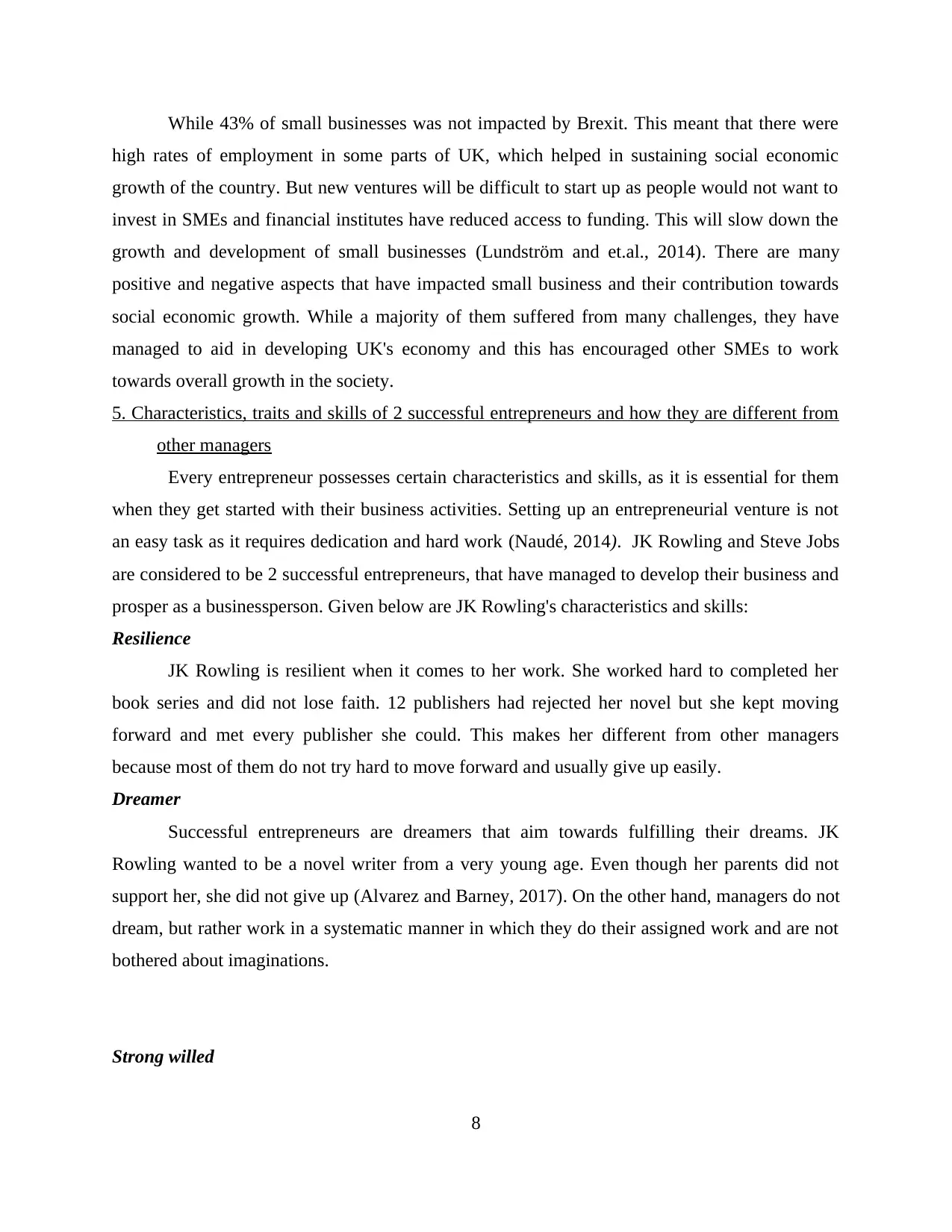
While 43% of small businesses was not impacted by Brexit. This meant that there were
high rates of employment in some parts of UK, which helped in sustaining social economic
growth of the country. But new ventures will be difficult to start up as people would not want to
invest in SMEs and financial institutes have reduced access to funding. This will slow down the
growth and development of small businesses (Lundström and et.al., 2014). There are many
positive and negative aspects that have impacted small business and their contribution towards
social economic growth. While a majority of them suffered from many challenges, they have
managed to aid in developing UK's economy and this has encouraged other SMEs to work
towards overall growth in the society.
5. Characteristics, traits and skills of 2 successful entrepreneurs and how they are different from
other managers
Every entrepreneur possesses certain characteristics and skills, as it is essential for them
when they get started with their business activities. Setting up an entrepreneurial venture is not
an easy task as it requires dedication and hard work (Naudé, 2014). JK Rowling and Steve Jobs
are considered to be 2 successful entrepreneurs, that have managed to develop their business and
prosper as a businessperson. Given below are JK Rowling's characteristics and skills:
Resilience
JK Rowling is resilient when it comes to her work. She worked hard to completed her
book series and did not lose faith. 12 publishers had rejected her novel but she kept moving
forward and met every publisher she could. This makes her different from other managers
because most of them do not try hard to move forward and usually give up easily.
Dreamer
Successful entrepreneurs are dreamers that aim towards fulfilling their dreams. JK
Rowling wanted to be a novel writer from a very young age. Even though her parents did not
support her, she did not give up (Alvarez and Barney, 2017). On the other hand, managers do not
dream, but rather work in a systematic manner in which they do their assigned work and are not
bothered about imaginations.
Strong willed
8
high rates of employment in some parts of UK, which helped in sustaining social economic
growth of the country. But new ventures will be difficult to start up as people would not want to
invest in SMEs and financial institutes have reduced access to funding. This will slow down the
growth and development of small businesses (Lundström and et.al., 2014). There are many
positive and negative aspects that have impacted small business and their contribution towards
social economic growth. While a majority of them suffered from many challenges, they have
managed to aid in developing UK's economy and this has encouraged other SMEs to work
towards overall growth in the society.
5. Characteristics, traits and skills of 2 successful entrepreneurs and how they are different from
other managers
Every entrepreneur possesses certain characteristics and skills, as it is essential for them
when they get started with their business activities. Setting up an entrepreneurial venture is not
an easy task as it requires dedication and hard work (Naudé, 2014). JK Rowling and Steve Jobs
are considered to be 2 successful entrepreneurs, that have managed to develop their business and
prosper as a businessperson. Given below are JK Rowling's characteristics and skills:
Resilience
JK Rowling is resilient when it comes to her work. She worked hard to completed her
book series and did not lose faith. 12 publishers had rejected her novel but she kept moving
forward and met every publisher she could. This makes her different from other managers
because most of them do not try hard to move forward and usually give up easily.
Dreamer
Successful entrepreneurs are dreamers that aim towards fulfilling their dreams. JK
Rowling wanted to be a novel writer from a very young age. Even though her parents did not
support her, she did not give up (Alvarez and Barney, 2017). On the other hand, managers do not
dream, but rather work in a systematic manner in which they do their assigned work and are not
bothered about imaginations.
Strong willed
8
Paraphrase This Document
Need a fresh take? Get an instant paraphrase of this document with our AI Paraphraser
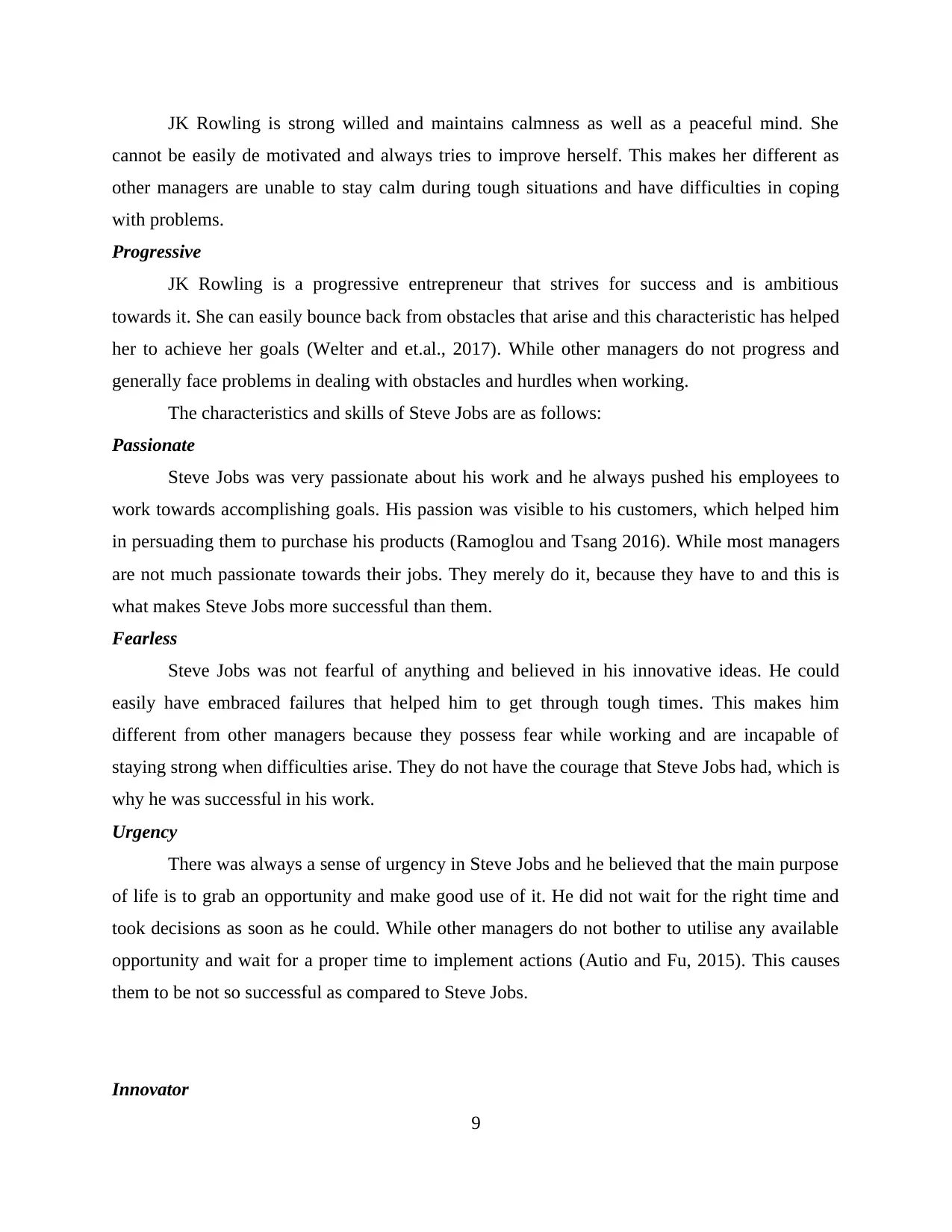
JK Rowling is strong willed and maintains calmness as well as a peaceful mind. She
cannot be easily de motivated and always tries to improve herself. This makes her different as
other managers are unable to stay calm during tough situations and have difficulties in coping
with problems.
Progressive
JK Rowling is a progressive entrepreneur that strives for success and is ambitious
towards it. She can easily bounce back from obstacles that arise and this characteristic has helped
her to achieve her goals (Welter and et.al., 2017). While other managers do not progress and
generally face problems in dealing with obstacles and hurdles when working.
The characteristics and skills of Steve Jobs are as follows:
Passionate
Steve Jobs was very passionate about his work and he always pushed his employees to
work towards accomplishing goals. His passion was visible to his customers, which helped him
in persuading them to purchase his products (Ramoglou and Tsang 2016). While most managers
are not much passionate towards their jobs. They merely do it, because they have to and this is
what makes Steve Jobs more successful than them.
Fearless
Steve Jobs was not fearful of anything and believed in his innovative ideas. He could
easily have embraced failures that helped him to get through tough times. This makes him
different from other managers because they possess fear while working and are incapable of
staying strong when difficulties arise. They do not have the courage that Steve Jobs had, which is
why he was successful in his work.
Urgency
There was always a sense of urgency in Steve Jobs and he believed that the main purpose
of life is to grab an opportunity and make good use of it. He did not wait for the right time and
took decisions as soon as he could. While other managers do not bother to utilise any available
opportunity and wait for a proper time to implement actions (Autio and Fu, 2015). This causes
them to be not so successful as compared to Steve Jobs.
Innovator
9
cannot be easily de motivated and always tries to improve herself. This makes her different as
other managers are unable to stay calm during tough situations and have difficulties in coping
with problems.
Progressive
JK Rowling is a progressive entrepreneur that strives for success and is ambitious
towards it. She can easily bounce back from obstacles that arise and this characteristic has helped
her to achieve her goals (Welter and et.al., 2017). While other managers do not progress and
generally face problems in dealing with obstacles and hurdles when working.
The characteristics and skills of Steve Jobs are as follows:
Passionate
Steve Jobs was very passionate about his work and he always pushed his employees to
work towards accomplishing goals. His passion was visible to his customers, which helped him
in persuading them to purchase his products (Ramoglou and Tsang 2016). While most managers
are not much passionate towards their jobs. They merely do it, because they have to and this is
what makes Steve Jobs more successful than them.
Fearless
Steve Jobs was not fearful of anything and believed in his innovative ideas. He could
easily have embraced failures that helped him to get through tough times. This makes him
different from other managers because they possess fear while working and are incapable of
staying strong when difficulties arise. They do not have the courage that Steve Jobs had, which is
why he was successful in his work.
Urgency
There was always a sense of urgency in Steve Jobs and he believed that the main purpose
of life is to grab an opportunity and make good use of it. He did not wait for the right time and
took decisions as soon as he could. While other managers do not bother to utilise any available
opportunity and wait for a proper time to implement actions (Autio and Fu, 2015). This causes
them to be not so successful as compared to Steve Jobs.
Innovator
9
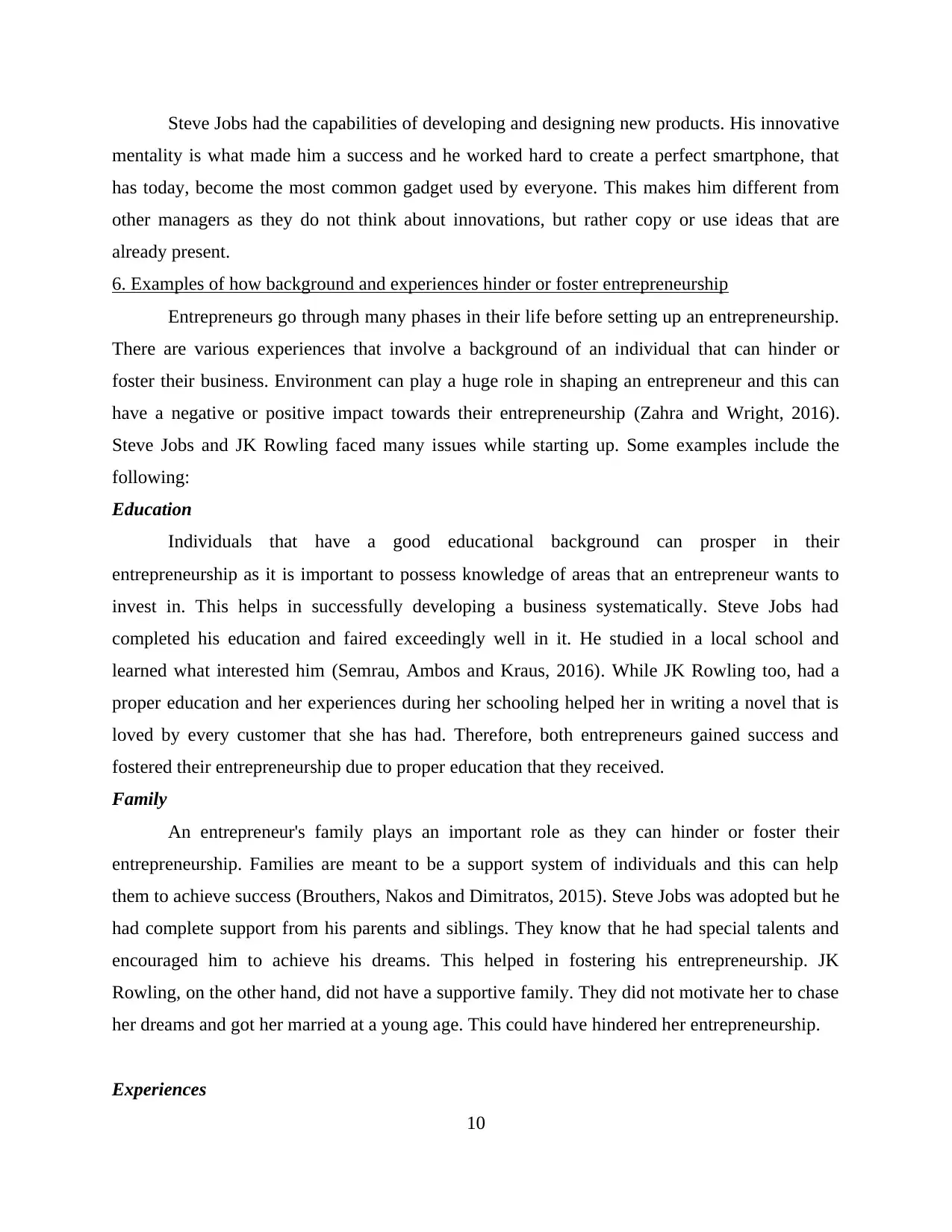
Steve Jobs had the capabilities of developing and designing new products. His innovative
mentality is what made him a success and he worked hard to create a perfect smartphone, that
has today, become the most common gadget used by everyone. This makes him different from
other managers as they do not think about innovations, but rather copy or use ideas that are
already present.
6. Examples of how background and experiences hinder or foster entrepreneurship
Entrepreneurs go through many phases in their life before setting up an entrepreneurship.
There are various experiences that involve a background of an individual that can hinder or
foster their business. Environment can play a huge role in shaping an entrepreneur and this can
have a negative or positive impact towards their entrepreneurship (Zahra and Wright, 2016).
Steve Jobs and JK Rowling faced many issues while starting up. Some examples include the
following:
Education
Individuals that have a good educational background can prosper in their
entrepreneurship as it is important to possess knowledge of areas that an entrepreneur wants to
invest in. This helps in successfully developing a business systematically. Steve Jobs had
completed his education and faired exceedingly well in it. He studied in a local school and
learned what interested him (Semrau, Ambos and Kraus, 2016). While JK Rowling too, had a
proper education and her experiences during her schooling helped her in writing a novel that is
loved by every customer that she has had. Therefore, both entrepreneurs gained success and
fostered their entrepreneurship due to proper education that they received.
Family
An entrepreneur's family plays an important role as they can hinder or foster their
entrepreneurship. Families are meant to be a support system of individuals and this can help
them to achieve success (Brouthers, Nakos and Dimitratos, 2015). Steve Jobs was adopted but he
had complete support from his parents and siblings. They know that he had special talents and
encouraged him to achieve his dreams. This helped in fostering his entrepreneurship. JK
Rowling, on the other hand, did not have a supportive family. They did not motivate her to chase
her dreams and got her married at a young age. This could have hindered her entrepreneurship.
Experiences
10
mentality is what made him a success and he worked hard to create a perfect smartphone, that
has today, become the most common gadget used by everyone. This makes him different from
other managers as they do not think about innovations, but rather copy or use ideas that are
already present.
6. Examples of how background and experiences hinder or foster entrepreneurship
Entrepreneurs go through many phases in their life before setting up an entrepreneurship.
There are various experiences that involve a background of an individual that can hinder or
foster their business. Environment can play a huge role in shaping an entrepreneur and this can
have a negative or positive impact towards their entrepreneurship (Zahra and Wright, 2016).
Steve Jobs and JK Rowling faced many issues while starting up. Some examples include the
following:
Education
Individuals that have a good educational background can prosper in their
entrepreneurship as it is important to possess knowledge of areas that an entrepreneur wants to
invest in. This helps in successfully developing a business systematically. Steve Jobs had
completed his education and faired exceedingly well in it. He studied in a local school and
learned what interested him (Semrau, Ambos and Kraus, 2016). While JK Rowling too, had a
proper education and her experiences during her schooling helped her in writing a novel that is
loved by every customer that she has had. Therefore, both entrepreneurs gained success and
fostered their entrepreneurship due to proper education that they received.
Family
An entrepreneur's family plays an important role as they can hinder or foster their
entrepreneurship. Families are meant to be a support system of individuals and this can help
them to achieve success (Brouthers, Nakos and Dimitratos, 2015). Steve Jobs was adopted but he
had complete support from his parents and siblings. They know that he had special talents and
encouraged him to achieve his dreams. This helped in fostering his entrepreneurship. JK
Rowling, on the other hand, did not have a supportive family. They did not motivate her to chase
her dreams and got her married at a young age. This could have hindered her entrepreneurship.
Experiences
10
⊘ This is a preview!⊘
Do you want full access?
Subscribe today to unlock all pages.

Trusted by 1+ million students worldwide
1 out of 16
Related Documents
Your All-in-One AI-Powered Toolkit for Academic Success.
+13062052269
info@desklib.com
Available 24*7 on WhatsApp / Email
![[object Object]](/_next/static/media/star-bottom.7253800d.svg)
Unlock your academic potential
Copyright © 2020–2026 A2Z Services. All Rights Reserved. Developed and managed by ZUCOL.





